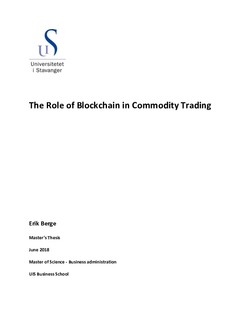The Role of Blockchain in Commodity Trading
Master thesis
Permanent lenke
http://hdl.handle.net/11250/2563235Utgivelsesdato
2018-06Metadata
Vis full innførselSamlinger
- Studentoppgaver (Business) [1035]
Sammendrag
The commodity industry, the transaction lifecycle of commodities, its value chain and supply chain are complex systems with many parties involved. Ownership of cargoes are determined by who is holding the physical paper, the Bill of Lading. The participants in the industry require constant verification between parties, and this resultsin cumbersome paper-heavy back-office operations which are exposed to human errors.
The entire commodity transaction life-cycle involves the value chain and supply chain, and it creates a complicated and long chain involving several intermediaries, each taking a piece of the pie and adds to transaction costs for producers. The roles of intermediaries in the commodity industry can be financing trades, facilitating trade, managing risk, on-site inspection and verification of cargoes, shipping, and logistics.
Blockchain technology is the technology underlying bitcoins and most of the cryptocurrencies in existence. Bitcoin enabled people to transfer money, peer-to-peer without an intermediary to establish trust and facilitate transactions. Bitcoin has paved the way for further use-cases of the technology, which has a much broader use-case spectrum than just being the underlying technology of cryptocurrencies.
Blockchain is a decentralized, distributed ledger, where transactions are stored in blocks and secured with cryptography. It allows anyone to execute trade without an intermediary to establish trust between parties. It allows for one single source of the truth between counterparties through enhancing transparency, visibility and availability of transactions data and information.
Blockchains can be fully transparent, but a blockchain can also allow for privacy. There are different types of blockchain, public/private/hybrid, and each of these types serves its purpose a little bit differently. In a private or hybrid blockchain, information that is sensitive to a certain trade remains private by only allowing the counterparties of that trade transparency into the transactions of that certain trade.
The blockchain technology enhances cyber security through decentralization and cryptography. Digital tokens can replace the Bill of Lading to track ownership of cargoes. Smart contracts that self-execute triggered upon a set of predetermined conditions are among the features of blockchain technology. The convenience of blockchain technology, is that anyone at any time can build its own decentralized application on top of already existing blockchain platforms like Ethereum, Hyperledger and others. These factors create for a unique opportunity to digitalize the commodity industry, gaining security, efficiency and opening up possibilities for new trade models in trade finance.
Beskrivelse
Master's thesis in Applied finance

